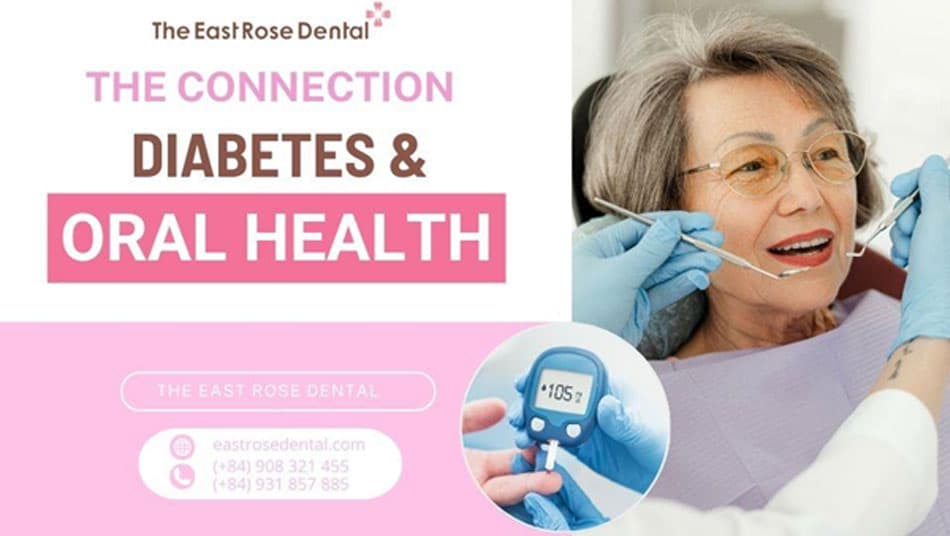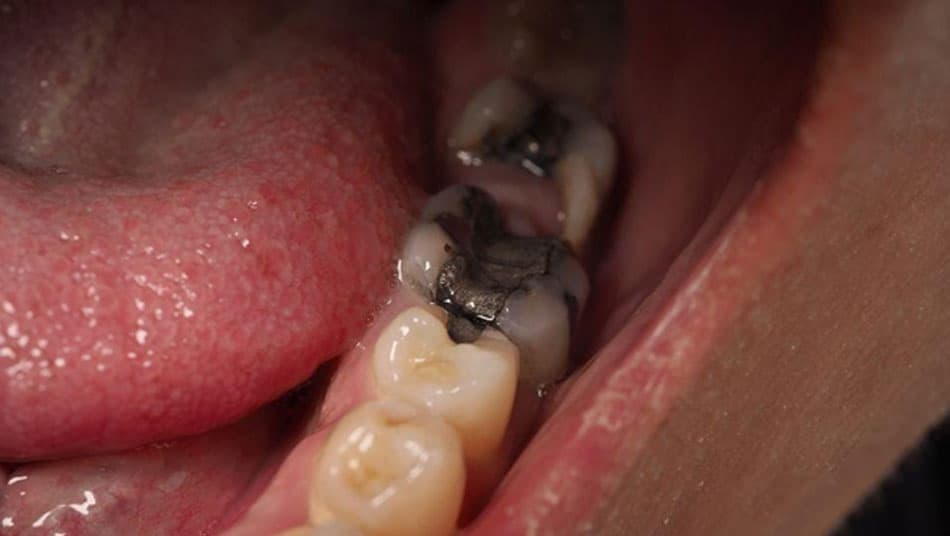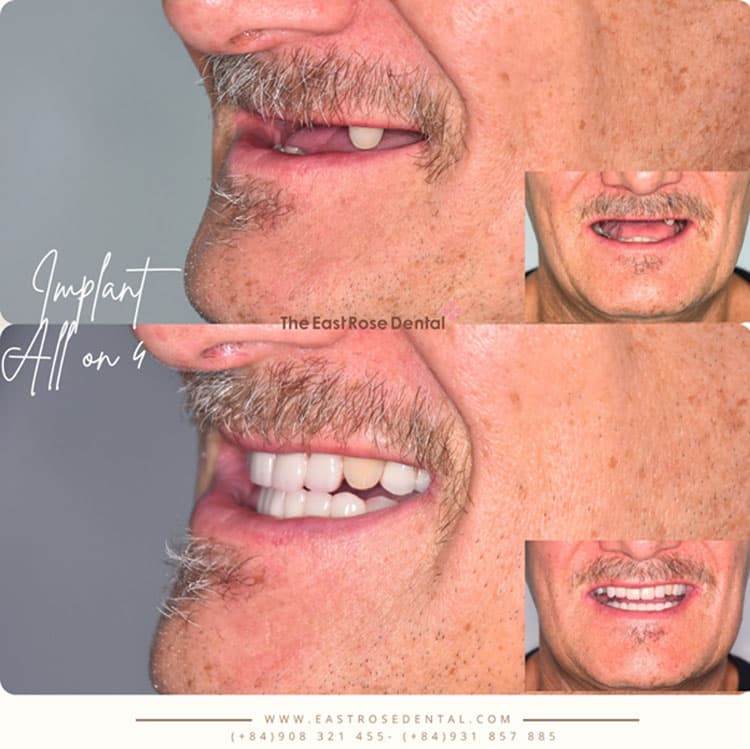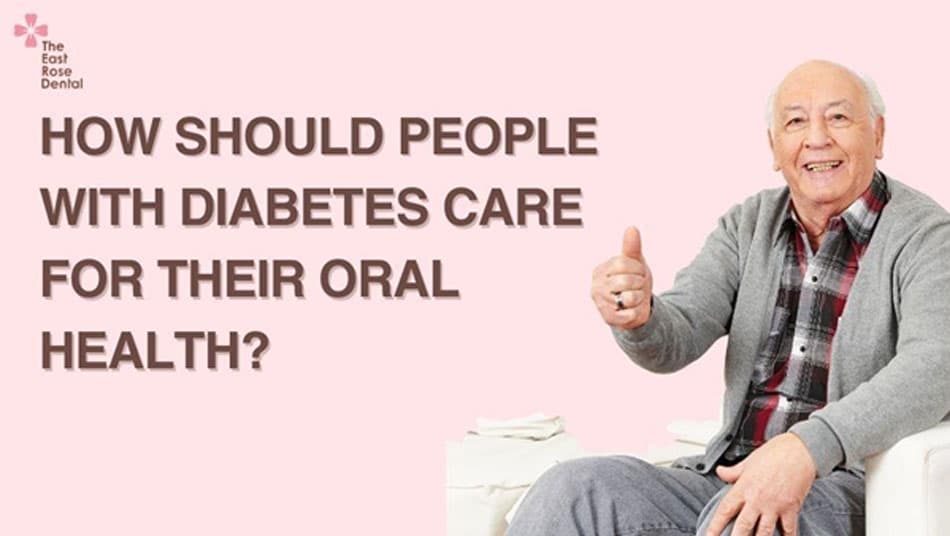Overview of Diabetes and Its Connection to Oral Health
Diabetes not only affects the heart and kidneys but also poses significant risks to oral health, such as gum disease, tooth decay, and tooth loss. Proper blood sugar control and diligent oral care can help minimize unnecessary complications. This article from The East Rose Dental Clinic explains why diabetes impacts oral health and how you can protect your overall well-being.
Overview of Diabetes and Its Connection to Oral Health

Diabetes is a chronic condition where the body either does not produce enough insulin or cannot use it effectively, leading to higher-than-normal blood sugar levels. There are two main types: Type 1 diabetes (commonly found in children and young people) and Type 2 diabetes (more prevalent in adults). This condition not only affects vital organs such as the heart, kidneys, and eyes but also has serious implications for oral health.
High blood sugar levels and metabolic disorders associated with diabetes can increase the risk of issues like gum inflammation, periodontitis, tooth decay, or dry mouth. Particularly in dental treatments, patients are more prone to infections and slower healing times. This underscores the importance of managing diabetes and maintaining effective oral care to minimize the risk of severe dental problems.
The effects of diabetes on oral health
Diabetes not only impacts overall health but also has negative effects on oral health. Below is a summary of the serious oral health issues that diabetes can cause, which you should be aware of.
Gingivitis and Periodontitis
People with diabetes are at a higher risk of developing gingivitis and periodontitis, two common but potentially dangerous oral health issues. When blood sugar levels are high, the immune system weakens, making it harder for the body to fight off bacteria that cause gingivitis. If left undiagnosed and untreated, this condition can progress to periodontitis, leading to bone loss around the teeth, loosening, and even tooth loss. This highlights the need for regular dental check-ups to detect and manage these issues early.
Tooth Decay

People with diabetes who experience consistently high blood sugar levels have increased sugar concentration in their saliva. This provides an ideal food source for bacteria that cause tooth decay to thrive. The bacteria produce acid that destroys tooth enamel and creates cavities. If not detected and treated promptly, tooth decay can spread, causing pain, infection, or even the need for tooth extraction. Proper oral hygiene and blood sugar control are the best ways to prevent this.
Dry Mouth
Diabetes often causes dry mouth due to reduced saliva production, a natural factor that helps protect the teeth and gums. Dry mouth not only leads to discomfort such as constant thirst and a dry tongue but also disrupts the mouth's ability to balance bacteria. This creates favorable conditions for bacteria that cause tooth decay and infections to thrive. Patients need to ensure they drink enough water, use products to moisturise the mouth, and maintain good oral hygiene.
Slow Healing
High blood sugar directly affects blood circulation and immune function, causing wounds in the mouth to heal more slowly than usual. This is particularly dangerous for those who have recently undergone dental surgeries, such as tooth extractions or implants. Slow healing also increases the risk of infection, which can lead to serious complications affecting overall health. Therefore, patients need to maintain stable blood sugar levels and strictly follow the dentist's instructions after treatment.
Increased Risk of Oral Fungal Infections
Diabetes disrupts the balance of microorganisms in the mouth, creating conditions for Candida, a naturally occurring yeast, to overgrow. This leads to oral fungal infections with symptoms such as a white coating on the tongue, soreness, or discomfort while eating and drinking. If left untreated, the infection can spread to other areas, posing a risk to surrounding regions and becoming difficult to control.
Early Tooth Loss

Issues such as periodontitis, tooth decay, and infections, if left uncontrolled, can lead to tooth loss. People with diabetes are at a higher risk of losing teeth due to a weakened immune system and slower healing ability. Tooth loss not only affects chewing ability, leading to nutritional deficiencies, but also impacts aesthetics and reduces self-confidence. This highlights the importance of proper oral care and regular dental check-ups to protect long-term dental health.
Bad Breath
An increase in oral bacteria or digestive issues related to unstable blood sugar levels can cause bad breath. Specifically, gum disease, periodontitis, or dry mouth—common problems in people with diabetes—are major contributors to this unpleasant odor. Bad breath not only affects confidence in communication but also serves as a warning sign that oral health needs attention and proper care.
How to Protect Oral Health for Diabetic Patients

Managing diabetes involves more than just diet and medication; it also requires attention to oral health. Here are some important ways diabetic patients can protect their teeth and gums effectively:
- Maintain stable blood sugar levels: Keeping blood sugar levels within a safe range reduces the risk of gum disease, tooth decay, and other oral health problems.
- Maintain excellent oral hygiene: Brush your teeth twice a day, floss, and use antibacterial mouthwash to remove plaque and protect your teeth and gums.
- Regular dental check-ups: Visit the dentist every six months for check-ups to detect and treat issues like gum disease or cavities early.
- Prevent dry mouth: Drink plenty of water, use sugar-free gum or artificial saliva to keep your mouth moist, and avoid alcohol-containing products.
- Healthy eating habits: Avoid sugary foods, and include more vegetables, healthy proteins, and calcium-rich foods to strengthen your teeth.
- Quit smoking: Giving up smoking helps reduce the risk of gum disease, improves blood circulation, and accelerates healing.
- Early intervention for abnormal signs: Visit the dentist if you notice swollen gums, bleeding, or unpleasant breath to prevent serious complications.
We hope that through this article, we have provided important information about the connection between diabetes and oral health. You can prevent serious issues by maintaining a proper oral care routine and controlling your blood sugar. If you need professional support, let The East Rose Dental Clinic accompany you in achieving a healthier, more beautiful smile with confidence every day.
Services
Working Time
- Monday - Friday: 08:00 - 19:00
- Saturday: 08:00 - 18:00
- Sunday closed
Contact Info
- Hotline 1: (+84) 908 321 455
- Hotline 2: (+84) 931 857 885
- Mobile: (+84) 8 3925 8778
- Phone: (+84)2 838 258 778
- info@dentalrose.net
- rosedentalclinicvn@gmail.com
 English
English  Tiếng Việt
Tiếng Việt

